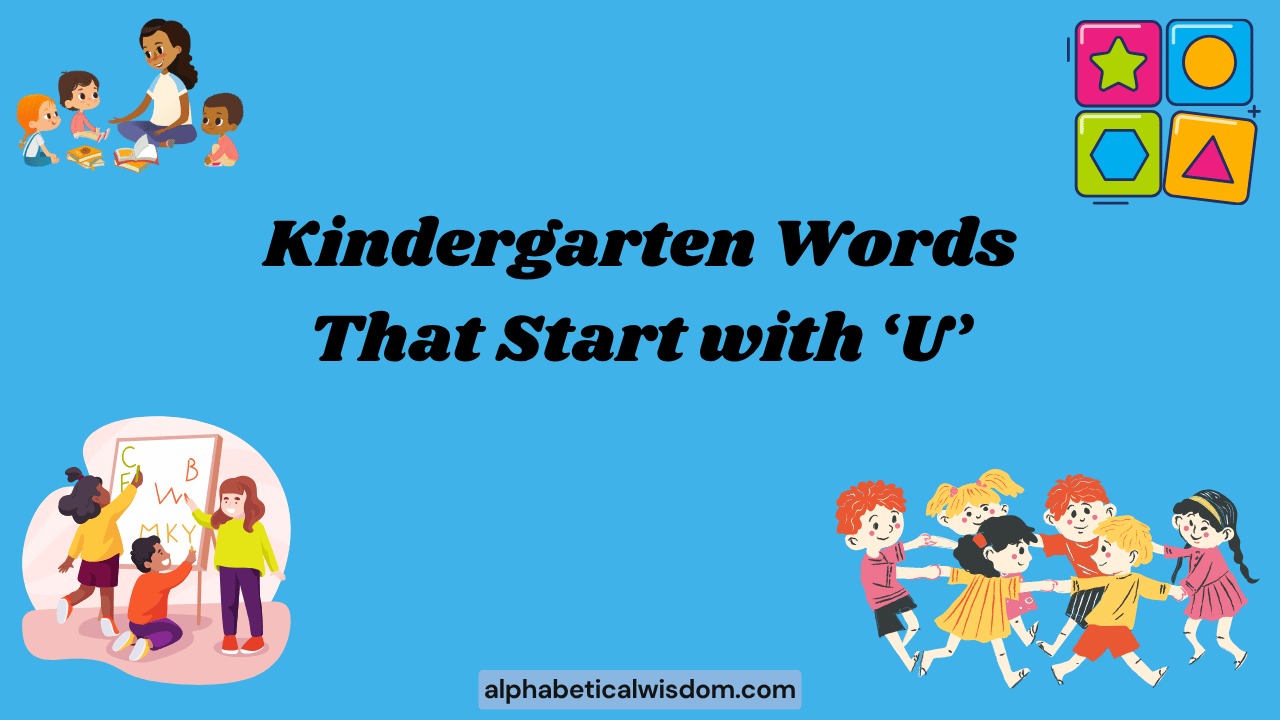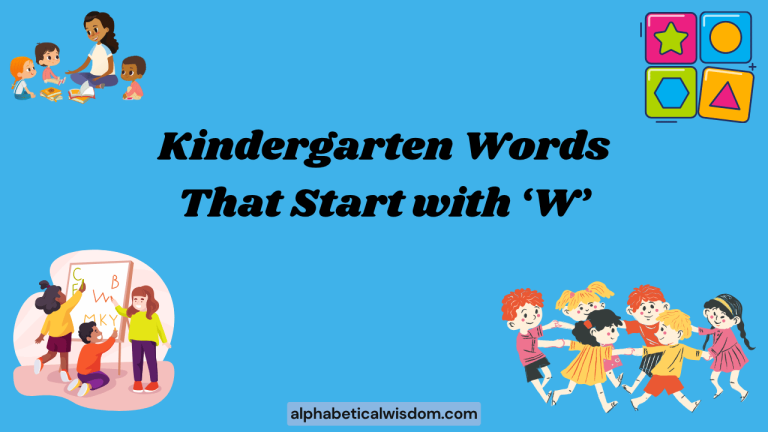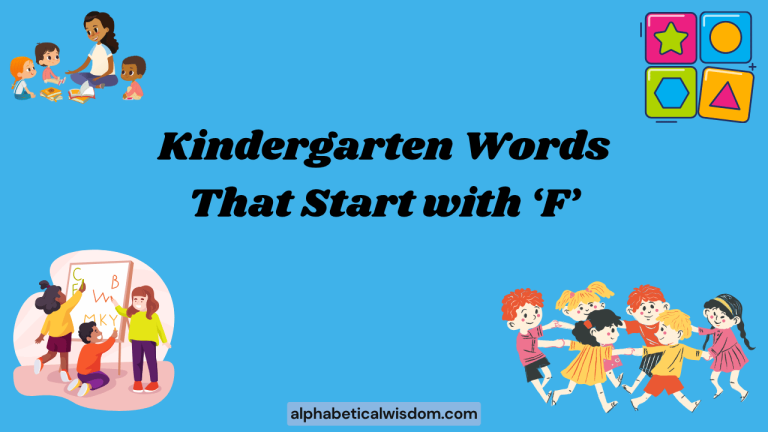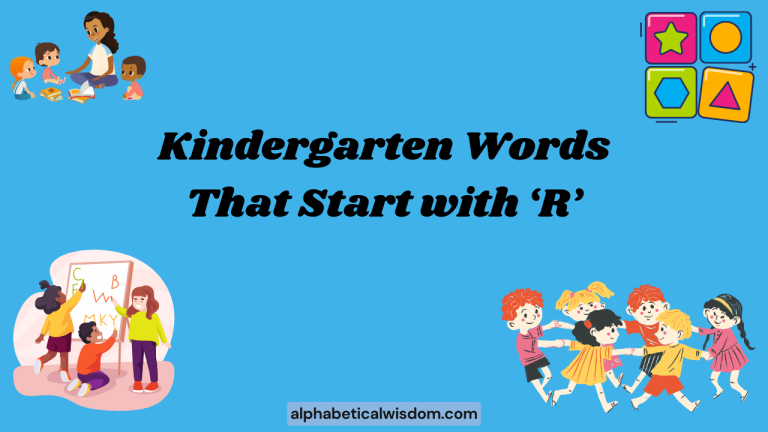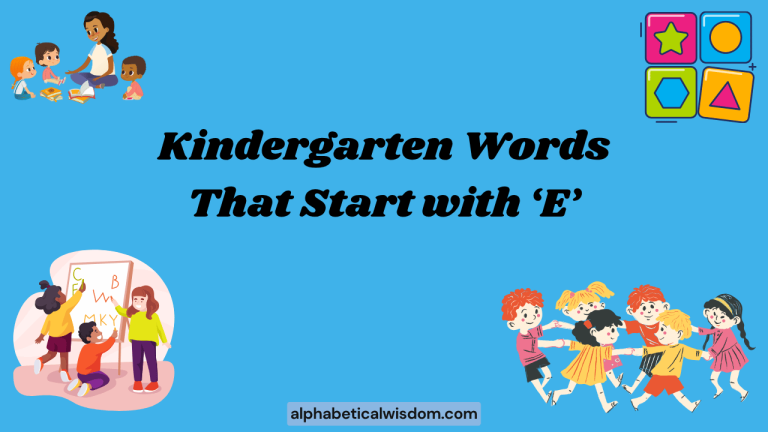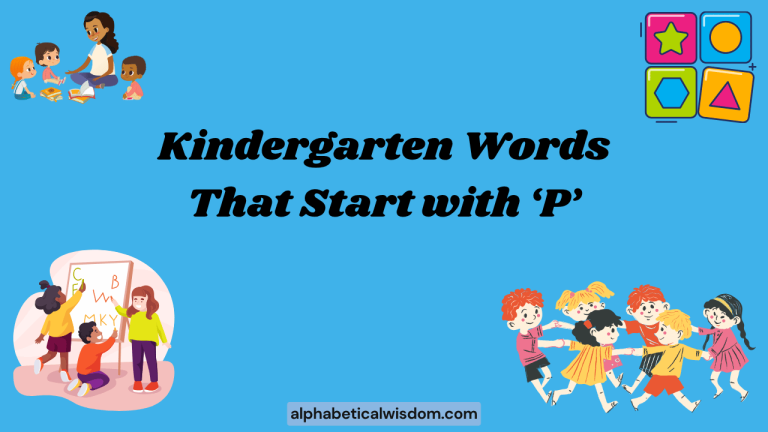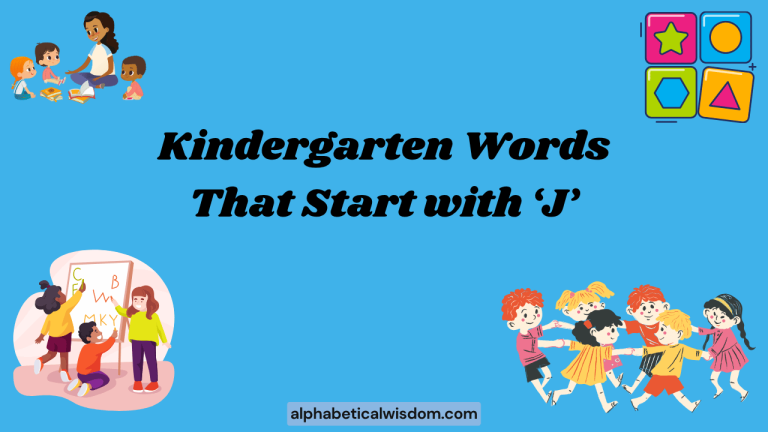Kindergarten Words Starting With U: A Comprehensive Guide
Understanding words that start with the letter ‘U’ is a foundational step in a child’s literacy journey. This article provides a comprehensive guide to these words, focusing on their definitions, usage, and structural elements.
It is designed to help parents, teachers, and young learners grasp these essential vocabulary building blocks. Mastering these words enhances reading comprehension, vocabulary, and overall communication skills.
This guide is tailored for kindergarten-level learners and those supporting their language development.
Table of Contents
- Introduction
- Definition of Kindergarten Words Starting with U
- Structural Breakdown of Words Starting with U
- Types and Categories of ‘U’ Words for Kindergarten
- Examples of Kindergarten Words Starting with U
- Usage Rules for ‘U’ Words in Sentences
- Common Mistakes When Using ‘U’ Words
- Practice Exercises
- Advanced Topics: Expanding Vocabulary with ‘U’
- Frequently Asked Questions (FAQ)
- Conclusion
Introduction
The letter ‘U’ might not be the most common starting letter for words, but it introduces children to unique sounds and concepts. Recognizing and understanding words beginning with ‘U’ is crucial for early literacy development.
This article aims to provide a structured approach to learning these words, enhancing vocabulary, and improving reading skills. We will explore different types of ‘U’ words, their meanings, and how to use them correctly in sentences.
This guide is designed to be accessible and engaging for young learners.
Definition of Kindergarten Words Starting with U
Kindergarten words starting with ‘U’ are basic vocabulary terms that are typically introduced to children aged 4-6 years. These words are simple, easy to pronounce, and represent familiar objects or concepts. Understanding these words helps children build a strong foundation for reading and writing. The letter ‘U’ can produce different sounds, such as the short ‘u’ as in up or the long ‘u’ as in unicorn. Recognizing these different sounds is a key part of phonics learning.
The function of these words is to introduce young learners to the basic building blocks of language. They help children understand that words represent objects, actions, and ideas.
Contextually, these words are used in simple sentences and stories designed for early readers. They are also commonly used in classroom activities and games to reinforce learning.
The goal is to make learning fun and engaging while building essential literacy skills.
Structural Breakdown of Words Starting with U
Words starting with the letter ‘U’ can be broken down into their basic structural elements: the initial ‘U’ sound, followed by other letters that form the word. Understanding these structures helps children with decoding and spelling. For example, the word up consists of the ‘u’ sound followed by the ‘p’ sound. Similarly, under consists of ‘u’ followed by ‘n’, ‘d’, ‘e’, and ‘r’.
Common patterns include the ‘u’ sound followed by consonants, as in us, under, and ugly. Another pattern involves the long ‘u’ sound, often represented by the combination ‘u-e’, as in use. Recognizing these patterns helps children predict and understand new words more easily. Breaking down words into their individual sounds also aids in phonemic awareness, a crucial skill for reading success. Furthermore, understanding syllable structure, even in these simple words, is a precursor to more complex vocabulary.
Types and Categories of ‘U’ Words for Kindergarten
Words starting with the letter ‘U’ can be categorized based on their function and meaning. Here are some common categories:
Nouns
Nouns are words that represent people, places, things, or ideas. Examples of ‘U’ nouns for kindergarten include umbrella, unicorn, and uniform. These words help children identify and name objects and concepts in their environment.
Verbs
Verbs are words that describe actions or states of being. Examples of ‘U’ verbs include use, understand, and untie. These words help children express actions and processes.
Adjectives
Adjectives are words that describe nouns. Examples of ‘U’ adjectives include ugly, upset, and unhappy. These words help children describe the qualities of objects and people.
Adverbs
Adverbs are words that modify verbs, adjectives, or other adverbs. While less common in kindergarten, examples could include unusually (in simplified contexts). These words provide additional information about how, when, where, or to what extent an action is performed.
Examples of Kindergarten Words Starting with U
Here are some examples of kindergarten words that start with the letter ‘U’, categorized for clarity. These examples are designed to be simple and easy for young learners to understand.
Examples of ‘U’ Nouns
The following table provides examples of nouns that start with ‘U’, along with simple sentences to illustrate their usage. These examples are suitable for kindergarten-level understanding.
| Word | Definition | Example Sentence |
|---|---|---|
| Umbrella | A device used for protection from rain or sun. | I need my umbrella because it is raining. |
| Unicorn | A mythical creature with a single horn. | The little girl loves the unicorn in the story. |
| Uniform | Special clothes worn by members of a group. | The students wear a school uniform every day. |
| Utensil | A tool used for eating or preparing food. | A spoon is a useful utensil. |
| Underwear | Clothes worn under other clothes. | I put on my underwear before my pants. |
| Urn | A container for ashes or tea. | The tea was served from a beautiful urn. |
| Umpire | A person who makes sure that players act according to the rules of a game. | The umpire made a call during the baseball game. |
| Union | A group of workers joined together for a common purpose. | The workers formed a union to protect their rights. |
| Universe | All existing matter and space. | The universe is vast and mysterious. |
| Ukelele | A small, guitar-like instrument. | She is learning to play the ukelele. |
| Udder | The mammary gland of a cow or other animal. | The farmer milked the cow’s udder. |
| Upstairs | The upper level of a building. | My bedroom is upstairs. |
| Undershirt | A shirt worn under another shirt. | He wore an undershirt to stay warm. |
| Underground | Below the surface of the earth. | The subway runs underground. |
| Update | A new version or improvement. | I installed an update on my computer. |
| Uptown | The northern part of a city. | We went to a restaurant uptown. |
| Usage | The way something is used. | The usage of this word is correct. |
| User | A person who uses something. | I am a user of this app. |
| Utility | A useful thing. | Electricity is a necessary utility. |
| Unit | A single, complete thing. | The classroom is one unit in the school. |
| Underpass | A road that goes under another road or railway. | We drove through the underpass. |
| Upkeep | The process of keeping something in good condition. | The house needs a lot of upkeep. |
| Upload | To transfer data from a computer to a website. | I will upload the photo to the website. |
| Uprising | A revolt or rebellion. | There was an uprising in the city. |
| Upward | Moving or pointing towards a higher place. | The arrow pointed upward. |
Examples of ‘U’ Verbs
This table showcases verbs that begin with ‘U’, accompanied by example sentences to illustrate their use. These verbs are suitable for kindergarten-level understanding.
| Word | Definition | Example Sentence |
|---|---|---|
| Use | To employ something for a purpose. | I use a pencil to write. |
| Understand | To comprehend the meaning of something. | I understand what you are saying. |
| Untie | To undo a knot or fastening. | Can you untie my shoelaces? |
| Unwrap | To remove the wrapping from something. | I will unwrap my gift. |
| Urge | To strongly encourage someone to do something. | I urge you to be careful. |
| Undergo | To experience or be subjected to something. | I will undergo a test. |
| Unite | To come together as one. | We need to unite as a team. |
| Upset | To make someone unhappy or worried. | Don’t upset the baby. |
| Utilize | To make practical and effective use of something. | We can utilize this resource. |
| Update | To make something more modern or up to date. | I need to update my computer software. |
| Underline | To draw a line under something. | Please underline the important words. |
| Undress | To take off clothes. | I will undress before taking a bath. |
| Unfold | To open or spread out something that has been folded. | Can you unfold the map? |
| Unlock | To open a lock with a key. | I will unlock the door. |
| Unpack | To remove items from a suitcase or box. | I need to unpack my suitcase. |
| Uphold | To maintain or support something. | We must uphold the rules. |
| Upgrade | To improve or enhance something. | I want to upgrade my phone. |
| Underestimate | To consider something as less powerful or important than it is. | Don’t underestimate your abilities. |
| Usher | To show someone where they should sit or go. | The usher will usher us to our seats. |
| Unravel | To undo twisted or knitted threads. | The yarn began to unravel. |
| Uncover | To remove a covering from something. | Let’s uncover the surprise! |
| Underpay | To pay someone less than they deserve. | The company might underpay some of their workers. |
| Underperform | To perform less well than expected. | The team might underperform during the game. |
| Undersell | To sell something for less than its value. | The shop might undersell some of its products. |
| Undervalue | To not recognize the worth of something. | Sometimes people undervalue their impact. |
Examples of ‘U’ Adjectives
The following table provides examples of adjectives starting with ‘U’, along with simple sentences to illustrate their usage. These examples are suitable for kindergarten-level understanding.
| Word | Definition | Example Sentence |
|---|---|---|
| Ugly | Unpleasant or unattractive in appearance. | The monster is very ugly. |
| Upset | Unhappy, disappointed, or worried. | She is upset because she lost her toy. |
| Unhappy | Not happy or satisfied. | The boy is unhappy because he fell down. |
| Unfair | Not just or equitable. | It is unfair to cheat in a game. |
| Unkind | Lacking in sympathy or understanding. | It is unkind to laugh at others. |
| Uneven | Not level or smooth. | The road is very uneven. |
| Unique | Being the only one of its kind. | The snowflake is unique. |
| Used | Having been used before. | This is a used book. |
| Useful | Able to be used for a practical purpose. | A pencil is a useful tool. |
| Ultimate | Being the best or most extreme example of its kind. | This is the ultimate toy! |
| Underground | Located or operating below the surface of the earth. | There is an underground train. |
| Underpaid | Receiving less money than one deserves. | The worker felt underpaid. |
| Unfinished | Not completed. | The painting is unfinished. |
| Unforgettable | Impossible to forget. | The trip was unforgettable. |
| Unfortunate | Having bad luck. | It was an unfortunate accident. |
| Unhealthy | Not good for your health. | Smoking is unhealthy. |
| Unidentified | Not recognized or identified. | The object was unidentified. |
| Unimportant | Not important. | The detail was unimportant. |
| Unlikely | Not likely to happen. | It is unlikely to rain today. |
| Unlimited | Without limits. | There is unlimited ice cream! |
| Unmanned | Without a crew. | The drone was unmanned. |
| Unnatural | Not normal or natural. | The color was unnatural. |
| Unoccupied | Not occupied. | The seat was unoccupied. |
| Unpleasant | Not pleasant or enjoyable. | The smell was unpleasant. |
| Unpopular | Not liked by many people. | The idea was unpopular. |
Usage Rules for ‘U’ Words in Sentences
When using ‘U’ words in sentences, it is important to consider the context and meaning of the word. Here are some general rules:
- Nouns: Nouns are used to name objects, people, places, or ideas. They can be singular or plural. For example, “The umbrella is red.”
- Verbs: Verbs are used to describe actions or states of being. They must agree with the subject of the sentence. For example, “I use a pencil.”
- Adjectives: Adjectives are used to describe nouns. They usually come before the noun they modify. For example, “The ugly monster scared me.”
Exceptions and Special Cases: Some ‘U’ words can function as different parts of speech depending on the context. For example, use can be a verb (“I use a pencil”) or a noun (“This is of no use”). Understanding these nuances is important for correct usage.
Common Mistakes When Using ‘U’ Words
Here are some common mistakes that young learners make when using ‘U’ words:
Mispronunciation: Confusing the short ‘u’ sound (as in up) with the long ‘u’ sound (as in use).
Correct: “I went up the hill.”
Incorrect: “I went use the hill.”
Incorrect Spelling: Misspelling common ‘U’ words due to phonetic similarities.
Correct: “I have an umbrella.”
Incorrect: “I have an umbrela.”
Incorrect Usage: Using the wrong part of speech in a sentence.
Correct: “The monster is ugly.”
Incorrect: “The monster is uply.”
Practice Exercises
Test your understanding of ‘U’ words with these practice exercises.
Exercise 1: Fill in the Blanks
Fill in the blanks with the correct ‘U’ word from the list: umbrella, use, ugly, understand, uniform.
| Question | Answer |
|---|---|
| 1. I need an __________ when it rains. | umbrella |
| 2. I __________ my pencil to draw. | use |
| 3. The monster is __________. | ugly |
| 4. I __________ what you are saying. | understand |
| 5. The students wear a school __________. | uniform |
| 6. The weather is quite __________ today. | unusual |
| 7. We went __________ the bridge. | under |
| 8. She feels __________ because she lost her toy. | upset |
| 9. I __________ the gift carefully. | unwrapped |
| 10. The cat likes to __________ the yarn. | unravel |
Exercise 2: True or False
Determine whether the following statements are true or false.
| Statement | Answer |
|---|---|
| 1. An umbrella protects you from the sun. | True |
| 2. ‘Use’ is a noun. | False |
| 3. ‘Ugly’ is an adjective. | True |
| 4. ‘Understand’ is a noun. | False |
| 5. A uniform is worn by students. | True |
| 6. All words that start with ‘U’ are nouns. | False |
| 7. It is unkind to be upset. | False |
| 8. It is unfair to share your toys. | False |
| 9. An udder is part of a cow. | True |
| 10. A unicorn is a real animal. | False |
Exercise 3: Word Matching
Match the ‘U’ word with its definition.
| Word | Definition |
|---|---|
| 1. Unicorn | A. Not happy |
| 2. Umbrella | B. To employ for a purpose |
| 3. Ugly | C. A mythical creature |
| 4. Use | D. Not attractive |
| 5. Unhappy | E. Protection from rain |
Answers: 1-C, 2-E, 3-D, 4-B, 5-A
Advanced Topics: Expanding Vocabulary with ‘U’
For advanced learners, expanding vocabulary with more complex ‘U’ words can be beneficial. This includes words like ubiquitous, unanimous, and utilitarian. Understanding the nuances of these words requires a deeper comprehension of etymology and context. Encourage children to explore these words in more advanced reading materials and discussions.
Additionally, exploring compound words that include ‘U’ can also enhance vocabulary. For example, understanding words like “underestimate,” “undergo,” and “underline” involves recognizing how the prefix “under-” modifies the base word’s meaning.
This understanding builds a stronger foundation for vocabulary acquisition and comprehension.
Frequently Asked Questions (FAQ)
Here are some frequently asked questions about kindergarten words starting with ‘U’.
- Why is it important for kindergarteners to learn words starting with ‘U’?
Learning words starting with ‘U’ expands their vocabulary, improves reading comprehension, and builds a strong foundation for future learning. It also introduces them to different sounds and structures in the English language, enhancing their phonemic awareness and overall literacy skills.
- What are some easy ‘U’ words to start with?
Easy ‘U’ words to start with include up, us, under, ugly, and umbrella. These words are simple, commonly used, and easy for young learners to pronounce and understand.
- How can I make learning ‘U’ words fun for my child?
You can make learning fun by using flashcards, games, and interactive activities. Reading books with ‘U’ words and creating simple sentences together can also be engaging. Make sure to provide positive reinforcement and celebrate their progress.
- What if my child struggles with pronouncing ‘U’ words?
Practice the sounds of the letter ‘U’ separately. Use visual aids and repeat the words slowly and clearly. Break down the words into syllables and encourage them to mimic your pronunciation. Patience and repetition are key.
- Are there any common ‘U’ words that are often confused?
Yes, words like up and use can be confused due to their similar sounds but different meanings. Make sure to explain the context and usage of each word clearly.
- How can I incorporate ‘U’ words into daily activities?
You can incorporate ‘U’ words into daily activities by pointing out objects that start with ‘U’, such as an umbrella on a rainy day. Use ‘U’ words in conversations and encourage your child to do the same.
- What resources are available to help my child learn ‘U’ words?
There are many online resources, including educational websites, apps, and videos. Libraries and bookstores also offer books and materials designed for early literacy development. Flashcards and workbooks can also be helpful.
- How important is it to teach the different sounds of the letter ‘U’?
Teaching the different sounds of the letter ‘U’ is crucial for phonics learning. It helps children decode words more effectively and improves their reading fluency. Make sure to emphasize the short ‘u’ sound (as in up) and the long ‘u’ sound (as in use).
- What are some strategies for teaching the spelling of ‘U’ words?
Use visual aids like flashcards with pictures and words. Practice writing the words repeatedly. Break down the words into syllables and focus on the sounds of each syllable. Use mnemonic devices to help remember tricky spellings.
- How can I assess my child’s understanding of ‘U’ words?
Use simple quizzes or worksheets with fill-in-the-blank questions. Ask them to create sentences using ‘U’ words. Observe their usage of ‘U’ words in conversations and written assignments. Provide feedback and encouragement to support their learning.
Conclusion
Mastering kindergarten words that start with ‘U’ is a significant step in a child’s early literacy development. This guide has provided a comprehensive overview of these words, including their definitions, usage, and structural elements.
By understanding these concepts and practicing regularly, young learners can build a strong foundation for reading and writing. Remember to make learning fun and engaging by using interactive activities and positive reinforcement.
Encourage children to explore new words and continue expanding their vocabulary. With consistent effort and support, they can achieve success in their literacy journey.
